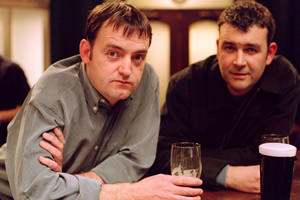
Early Doors
- TV sitcom
- BBC Two
- 2003 - 2004
- 12 episodes (2 series)
Sitcom set in a small Manchester pub created by Craig Cash and Phil Mealey. Joe and Duffy pass the time with landlord Ken and the other pub regulars. Also features John Henshaw, Rita May, Christine Bottomley, Rodney Litchfield, Mark Benton and more.
Episode menu
Series 1, Episode 1
Further details
Landlord, Ken, sets about organising the Big Boys' Beano, Jean and Winnie try to protect a friend's reputation and the local police, Phil and Nige attempt to solve the off-license robbery. Melanie's search for her real father progresses but is Ken really as pleased as he seems?
Broadcast details
- Date
- Monday 12th May 2003
- Time
- 9:30pm
- Channel
- BBC Two
- Length
- 30 minutes
Cast & crew
| John Henshaw | Ken |
| Craig Cash | Joe |
| Phil Mealey | Duffy |
| Rita May | Jean |
| Christine Bottomley | Melanie |
| Rodney Litchfield | Tommy |
| Mark Benton | Eddie |
| Lorraine Cheshire | Joan |
| James Quinn | Phil |
| Peter Wight | Nige |
| Susan Cookson | Tanya |
| Joan Kempson | Winnie |
| Lisa Millett | Debbie |
| Maxine Peake | Janice |
| Craig Cash | Writer |
| Phil Mealey | Writer |
| Adrian Shergold | Director |
| Lucy Ansbro | Producer |
| John Rushton | Producer |
| Mark Freeland | Executive Producer |
| Phil McIntyre | Executive Producer |
| Tony Cranstoun | Editor |
| David Roger | Production Designer |
Press
Another chance to catch the under-the-radar 2003 sitcom from Phil Mealey and long-term Caroline Aherne collaborator Craig Cash, which centred around the comings and goings of a Manchester pub. Naturalistically played, subtle and well worth sticking with.
Sharon Lougher, Metro, 13th January 2009The new sitcom Early Doors is a sort of kid of The Royle Family, but now being raised by the father alone. The series was being written by that show's co-creators, Craig Cash and Caroline Aherne, until, we may guess, she decided that a show set in a pub was not the perfect subject for her at the moment. She left and Cash co-opted a new dialogue buddy, Phil Mealey.
Cash has said that the plan had been for Aherne to play a landlady but that they had difficulty imagining the character. But Cash's admission raises the project's main problem, which is that pubs are as familiar a part of television as televisions are of pubs.
In fact, one of the reasons that The Royle Family was so daring was that experience of the medium led you to expect that they must eventually get off their arses and go to the pub, but they never did. Early Doors aims for the same claustrophobia by trapping the characters on one set, but people stuck on alehouse benches don't have the same visual shock as a whole family beached on a settee.
Shot in dirty light without a laughter-track, the show begins with landlord Ken (John Henshaw) in his empty empire, decanting cheap brandy into a posher bottle and diverting the charity box into the till.
The regulars arrive and exchange banalities ("temporary traffic lights over at Samuel Street"), inanities ("Joe's having a shit"), incomprehensible in-jokes and semi-derelict slang ("Keep your hand on your halfpenny"). Future plot possibilities are laid down: Ken's daughter isn't actually his and there's also doubt about the father of her own child. Many scenes take place in the gents, the soundtrack featuring the meticulous drip of piss and plop of shit.
In the modern style - The Office, Phoenix Nights - it's the kind of comedy that should come with a bottle of paracetamol or a length of rubber tubing for the car. The theme could be described as the loneliness of company. It's potentially brilliant, but the pisser is that viewers have spent so much time in pubs. Though in Aherne's absence they've sensibly dispensed with a landlady, Ken keeps tripping over Al Murray's pub landlord.
Mark Lawson, The Guardian, 12th May 2003